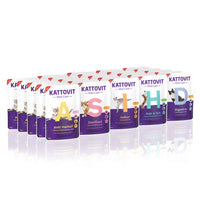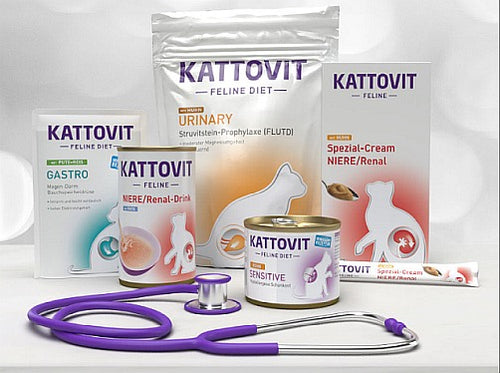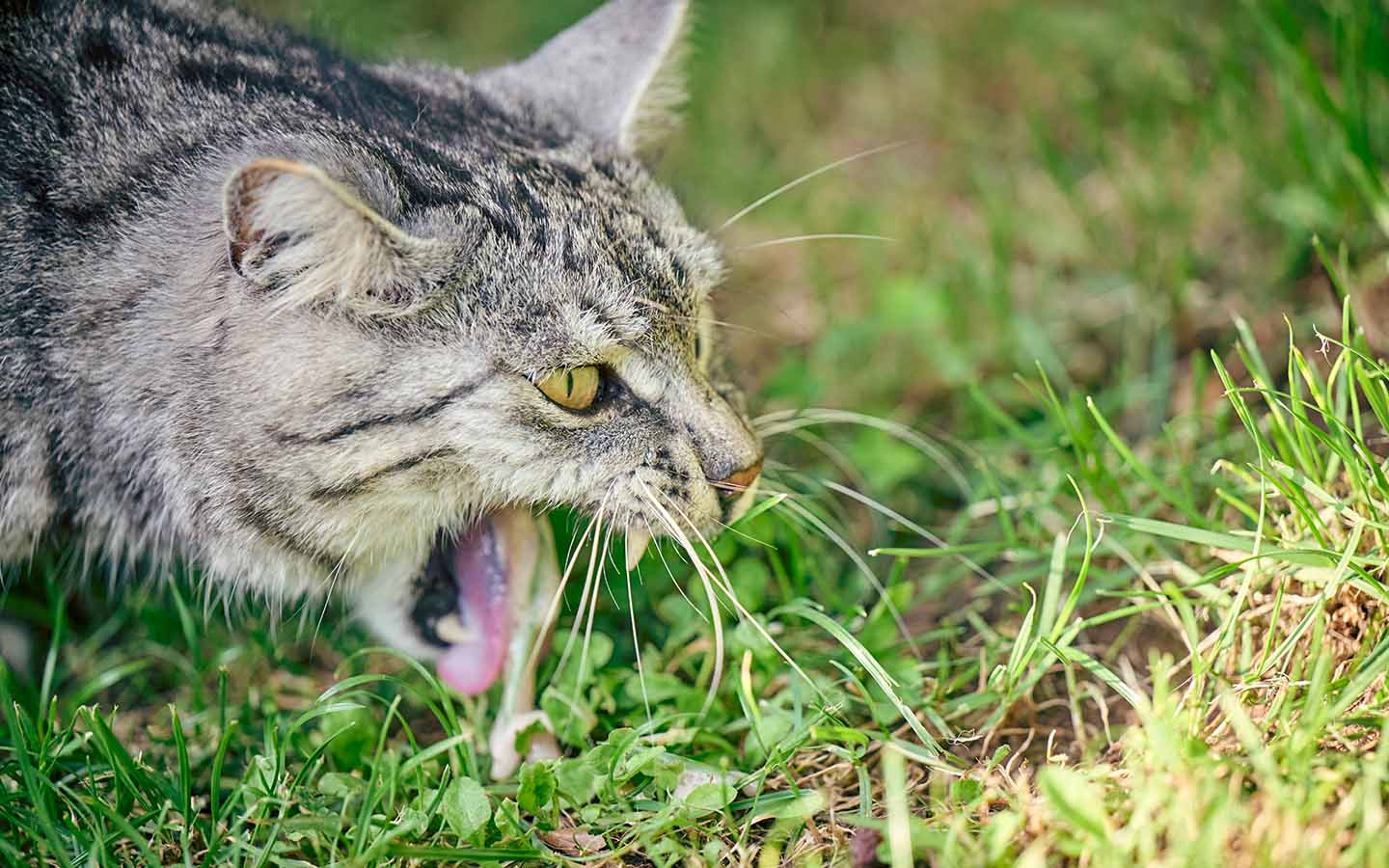Tips to support coat change in cats: diet, supplements and care
Cat owners know the typical sound and posture when a cat vomits. Vomiting does not always mean something bad. Nevertheless, it is important to observe the cat closely and to see a vet if anything unusual is noticed. We will show you what could be causing your cat to vomit, when you should take your furry friend to the vet and how you can treat the animal.
Reasons why your cat vomits
Vomiting is an active process and can be divided into three phases in both humans and cats: nausea, gagging phase and actual vomiting . As saliva production is stimulated, cats lick their lips more frequently and swallow excessively before vomiting. The stomach contents are expelled by repeated contractions of the diaphragm, abdominal wall and stomach.
It is important to distinguish between a cat's vomiting and what is known as regurgitation. Regurgitation is the bringing up of food or water from the esophagus or stomach - without nausea and without using the abdominal muscles. In contrast to vomiting, it is a passive process that is usually associated with a disease of the esophagus.
Observe your pet's vomiting, do not stress it and give it peace. Vomiting is the body's protective reaction against pathogens and foreign bodies. Cats do not vomit out of frustration, but because the body wants to protect itself. Therefore, do not punish your house cat after vomiting. However, observe it in any case and try to find out the reason for your cat's vomiting. In many cases, the cause can be identified from the vomit.
[Sensitive]
hairballs and grass
Regurgitating grass, hairballs or, in the case of outdoor cats, the remains of prey animals can be considered unproblematic if the general condition is good. If your pet's coat changes in spring and autumn, this could be a reason for your cat vomiting more often. When the coat changes, animals shed a lot of hair, which means that more hair is swallowed when grooming. This often leads to hairballs forming in the stomach. These are usually harmless and are expelled by the cat through gagging or vomiting.
If your cat vomits foam or a watery puddle with a hairball in it, you don't need to worry at first. In fact, regurgitating the hairball is important because larger hairballs can restrict the activity of the gastrointestinal tract and cause irritation or, in the worst case, intestinal obstruction.
If you find grass in a clear puddle of vomit, there is no need to worry. Cats cannot digest grass well, but they are happy to eat it because the indigestibility of the grass helps them to remove hairballs and other indigestible material that has collected in their stomachs. to vomit it up again. So give your cat access to cat grass, especially during the shedding season. For indoor cats, the grass can also be placed in a plant pot in the apartment for this purpose. Spider plants are also often offered to cats, but it should be remembered that spider plants absorb more pollutants from the air than many other plants and can therefore be contaminated with household toxins.
food intolerances and poisonings
Contrary to what is portrayed in films and television, dairy products are not always easy on cats' stomachs. As much as the animals like to drink a bowl of milk, it can also be very bad for their stomachs. Cats generally cannot tolerate lactose. The consequences of eating foods containing lactose are nausea, vomiting and diarrhea. If you still want to do something good for your pet now and then, choose lactose-free milk or special cat milk. However, milk should not become a permanent part of the diet, as it is very high in calories.
If you have a dog as well as a cat, you should make sure that the cat does not eat the dog food. This may contain ingredients that your cat cannot tolerate and which it will then vomit up. In addition, dog food does not contain enough of the amino acid taurine, which is essential for cats, the protein content is too low and the carbohydrate content too high. Constantly feeding dog food will therefore lead to deficiency symptoms in your cat.
In addition to dog food, cat food itself can also be the cause of vomiting. A food allergy or intolerance can occur in very young animals from around 6 months of age. These are often accompanied by vomiting, diarrhea or inflammation of the colon. The skin is often also affected with itching and inflammation. If these symptoms occur, you should consult your veterinarian about a change in diet and an exclusion diet.
Caution is advised if the cat has eaten something that is not intended for consumption. This includes small objects and strings that may be swallowed while playing, any foreign objects or poisonous houseplants. So do not let your house cat play with objects that could be swallowed unsupervised and check whether your plants are poisonous to cats.
If your cat is vomiting, you should check whether it might have eaten something poisonous in the garden. This applies to both plants and poison bait. In addition to vomiting, symptoms of poisoning include diarrhea, increased salivation, apathy, cramps, a drop in blood pressure, or liver and kidney dysfunction . Poisoning from ingesting poisoned rodents, medication, or chemicals is also possible. If you suspect that your cat has been poisoned, see a vet immediately.
anxiety and stress
Psychological reasons can also be the cause of your cat vomiting. For example, if it eats too quickly because it is afraid of its food being taken away, it may vomit. To avoid food jealousy, set up a separate food bowl for each animal - if necessary in different places in the house - and ensure peace and quiet at the feeding place.
Moving, traveling or even rearranging furniture can cause stress in your cat. Cats are creatures of habit and very sensitive. If their environment changes, they react with stress, which can also result in nausea and vomiting. In such cases, make sure that the usual routine is maintained as much as possible and give the cat plenty of attention.
infectious diseases and parasites
Cats that have contact with other cats in particular occasionally become infected with pathogens. Some pathogens are harmless, others can be dangerous for cats. The latter includes the panleukopenia virus, for example, which is highly contagious and can be fatal, especially for kittens. Adult indoor cats can also become ill - especially if they are not adequately vaccinated. The symptoms associated with the virus range from vomiting and diarrhea to apathy, loss of appetite and fever. Severe cases with rapid death without prior symptoms of illness can also occur. To prevent infection with the panleukopenia virus, you should have your cat vaccinated early.
Other gastrointestinal diseases can also be caused by other viruses, bacteria or parasites. If your furry friend vomits more often, especially in combination with Diarrhea , or if you notice a change in behavior, you should consult a veterinarian as soon as possible. Parasites include Giardia and worms too frequent triggers for vomiting. Since these are often pathogens that can also be transmitted to humans, such an infestation should be counteracted quickly. Giardia is treated with appropriately effective medication over several days. A worm infestation can be treated with preparations that are administered once. A repeat treatment after 14 days is usually advisable in order to kill off any developmental stages that may still be present. The success of the treatment should then be checked by examining a stool sample. Special diet food can help your cat to get back on its feet if it has gastrointestinal problems.
Organic diseases
In addition to external influences, organic diseases can also sometimes trigger vomiting. This includes, for example, hyperthyroidism, which affects the metabolism. If, in addition to vomiting, you notice unusual restlessness, cravings, weight loss, diarrhea, etc. and possibly great thirst and excessive urination , this could indicate an overactive thyroid.
Inflammation of the pancreas or stomach lining can also cause your cat to vomit. This is often accompanied by weight loss due to reduced appetite, apathy , dehydration, abdominal pain or diarrhea.
Inflammation of the gastric mucosa in cats has non-specific symptoms. Loss of appetite, changing appetite, salivation or vomiting after eating may be observed.
Vomiting can also be a symptom of acute or chronic renal failure . Acute renal failure can also accompanied by a severely disturbed general condition , fatigue, loss of appetite , urine-smelling bad breath or reduced urine output and should definitely be taken seriously and treated quickly.
Other causes of vomiting can include middle ear diseases, tumors, inflammation of the central nervous system, liver failure, diabetic ketoacidosis and many more. If your pet shows abnormal behavior in addition to repeated vomiting, you should urgently consult a veterinarian. The veterinarian can determine the cause of the vomiting by taking a stool sample, taking a blood sample or carrying out tests such as X-rays and CT scans. and how to treat it.
If you have already been diagnosed with a disease that is being treated with medication, the vomiting - if it occurs shortly after taking the medication - can also be caused by the medication. In this case, ask your doctor about an alternative.

Do not wait too long to visit the vet
If your cat vomits only once and the cause can be traced back to hairballs or grass consumption, a visit to the vet is not necessary. You can still call to make sure the animal is OK. However, if the vomiting lasts for 12 to 24 hours, a visit to the vet is unavoidable.
If you notice dark discoloration or even blood in the vomit, contact your vet immediately. This could be an injury after ingesting a foreign body or even ingestion of rat poison. which in the worst case could be life-threatening. Always tell the doctor about the color and consistency of the vomit. Yellow, green or white discoloration gives clues to the respective cause .
If the cat has only recently become your new roommate, it is always advisable to visit the vet if it vomits. Since you do not know the animal well, you may not be able to determine why the animal is vomiting. This way, possible chronic diseases can be ruled out - especially in kittens.
Prevent your cat from vomiting
Help your pet to groom its coat so that it does not swallow too much hair. Brush it especially in autumn and spring when it is shedding its fur. Another home remedy is to regularly give it a Malt paste prevents the formation of hairballs.
Avoid potential hazards in the home such as poisonous houseplants, loose cords or small objects. If there are small children in the household, do not leave them alone with the cat unsupervised so that the children do not accidentally give the cat the wrong thing to eat.
To prevent stress when eating , make sure that the feeding area is quiet and clean. When changing food, proceed gradually. Gradually add a little more of the new food to the old food. When feeding, it is generally important to ensure that the animal is not only fed in the morning and evening. If it becomes very hungry during the day or night, it will start to gorge itself in the evening or morning, which can lead to vomiting. It is better to give several small portions throughout the day.
If your cat has already vomited, do not feed it for the next few hours. If the animal has only upset its stomach, the vomiting should stop after a short time. Then feed your cat slowly with small portions of bland food or special food tailored to the cat so that the stomach is not irritated again.









